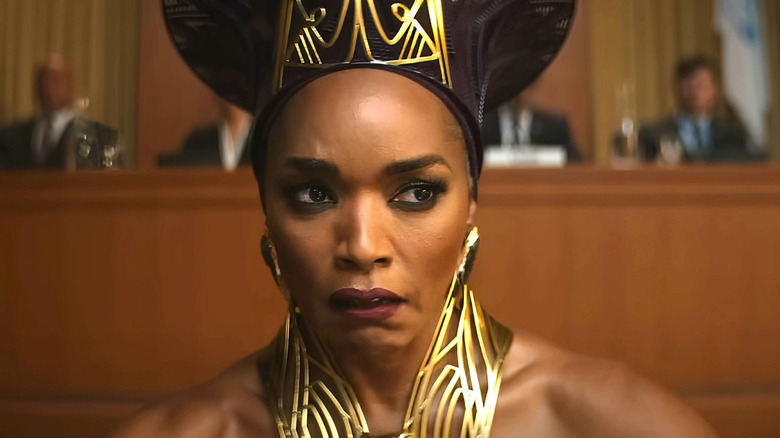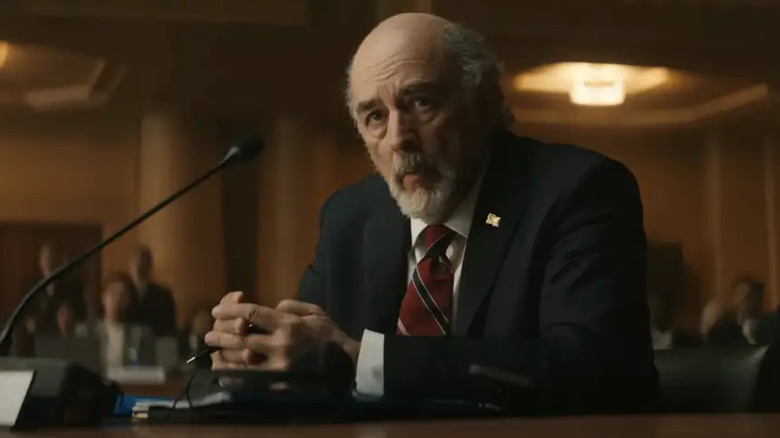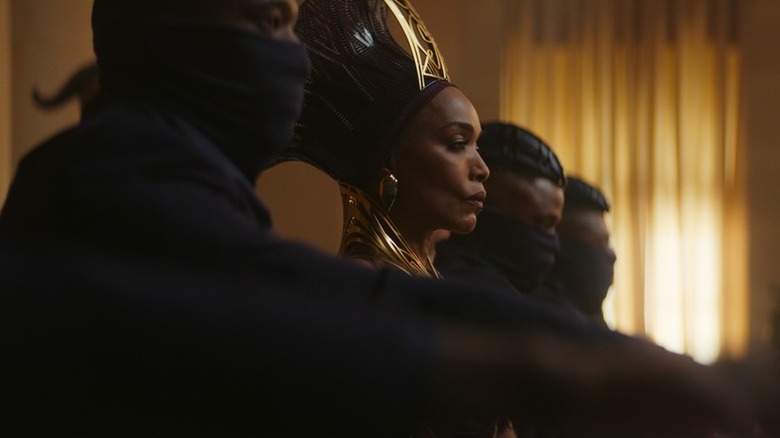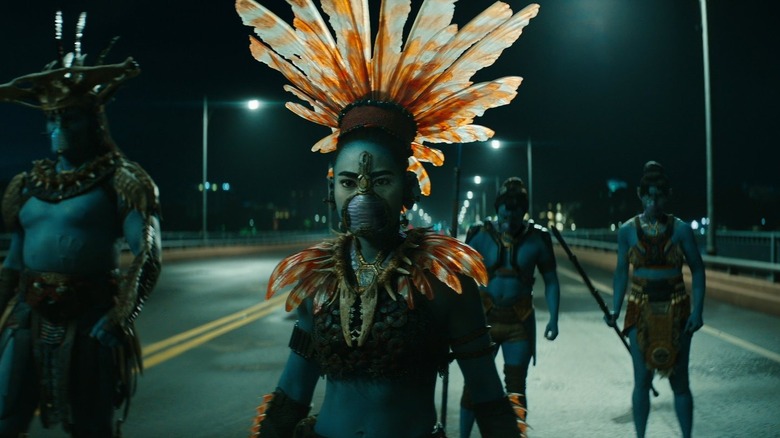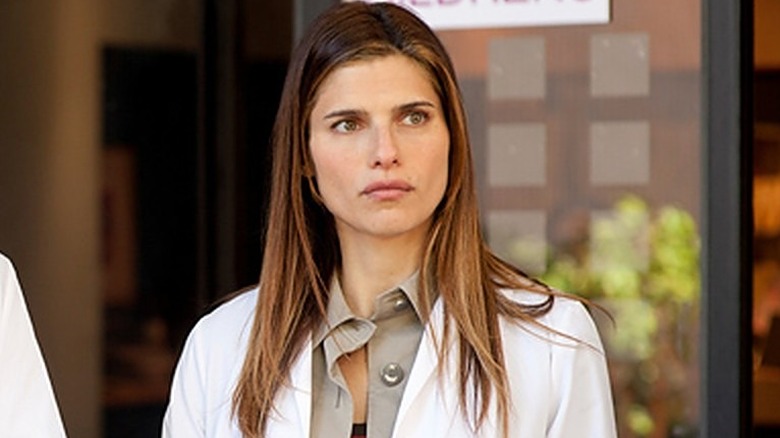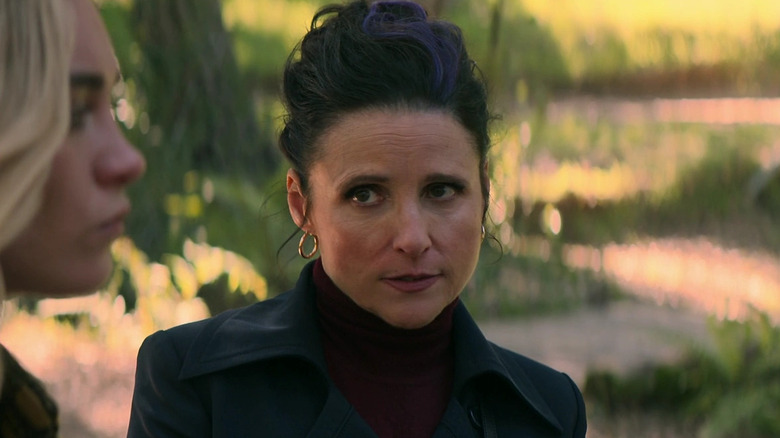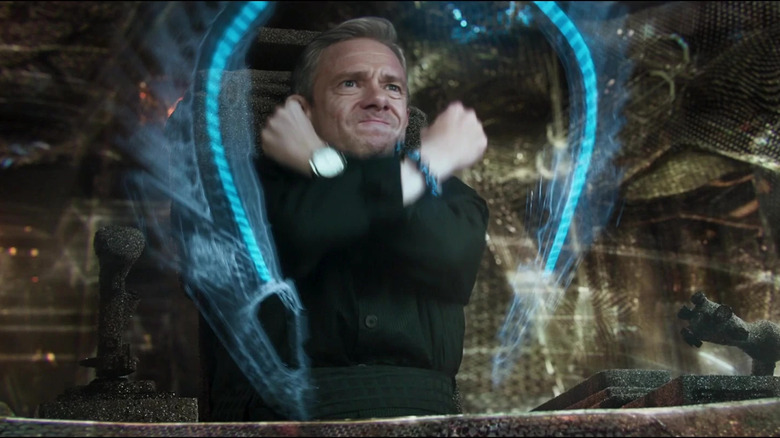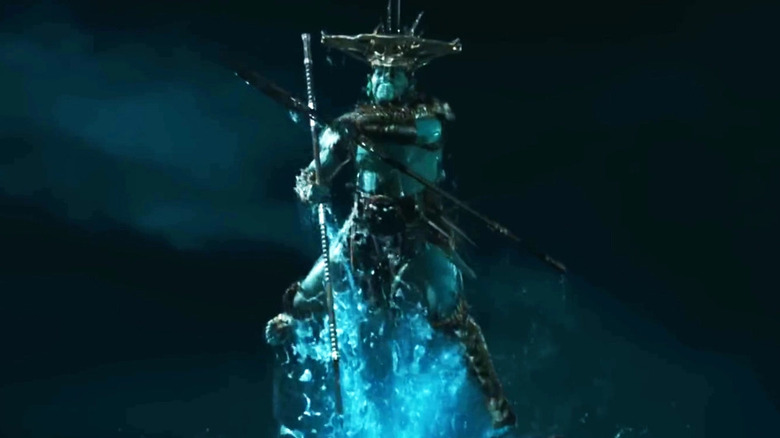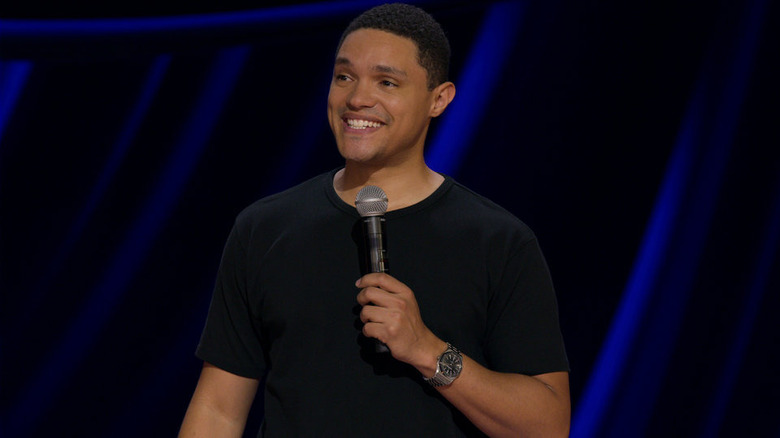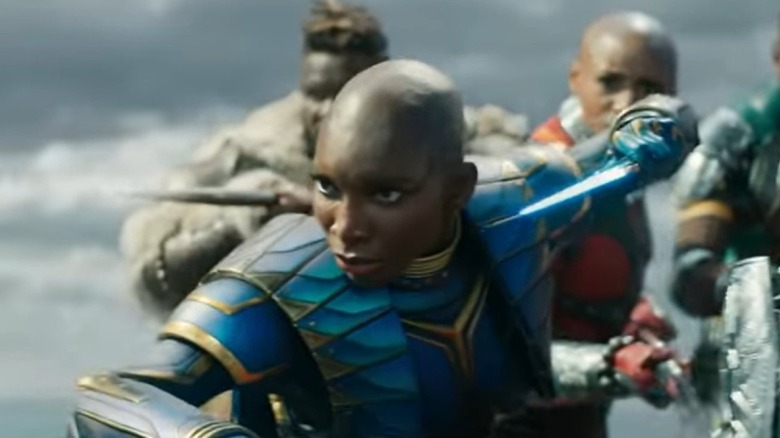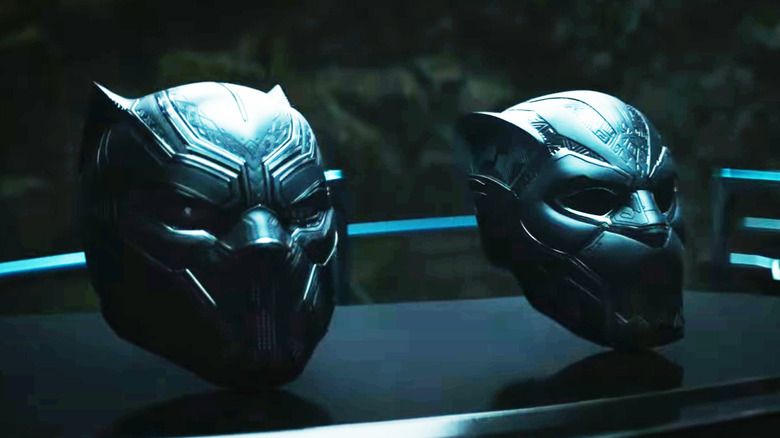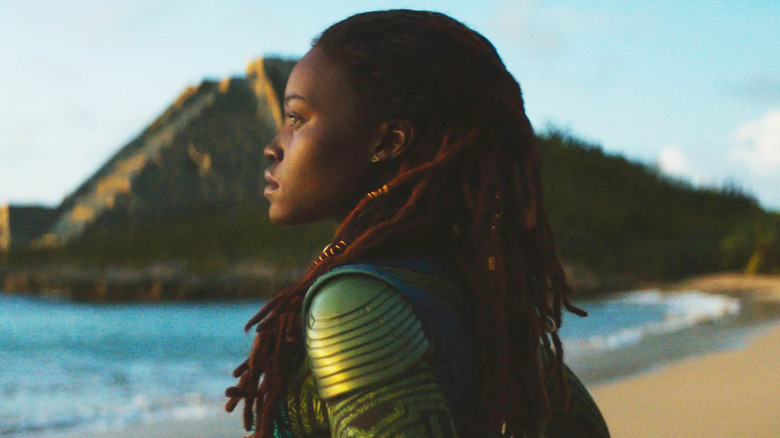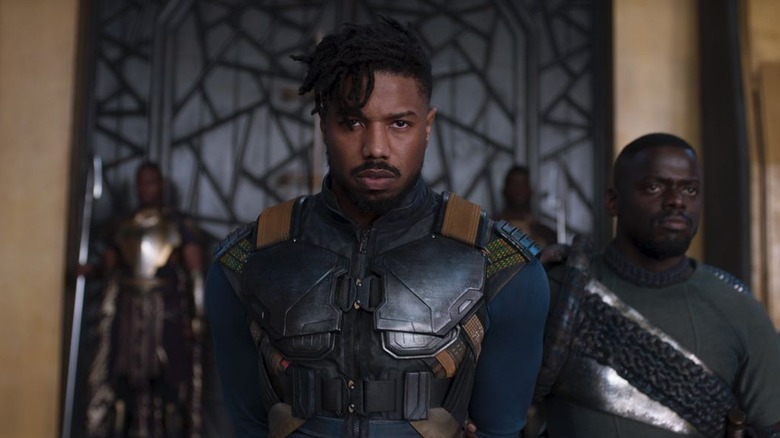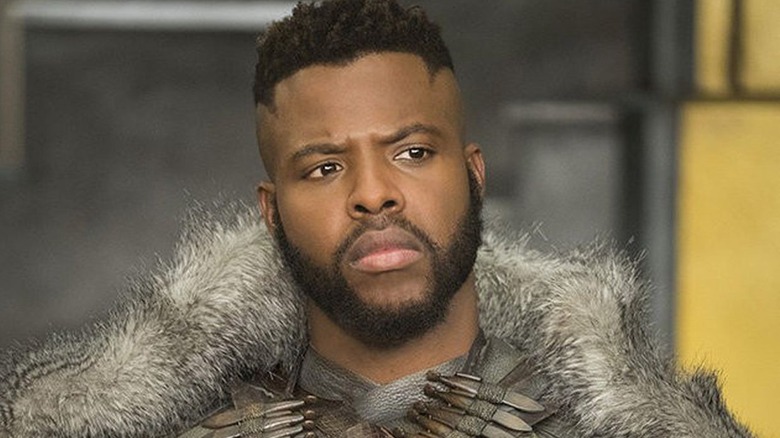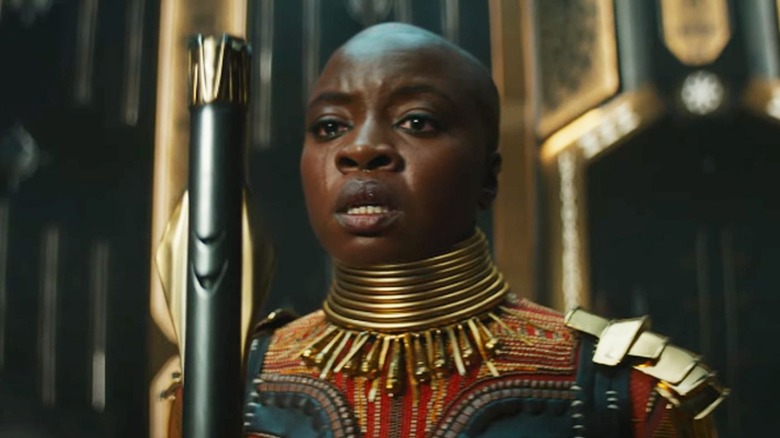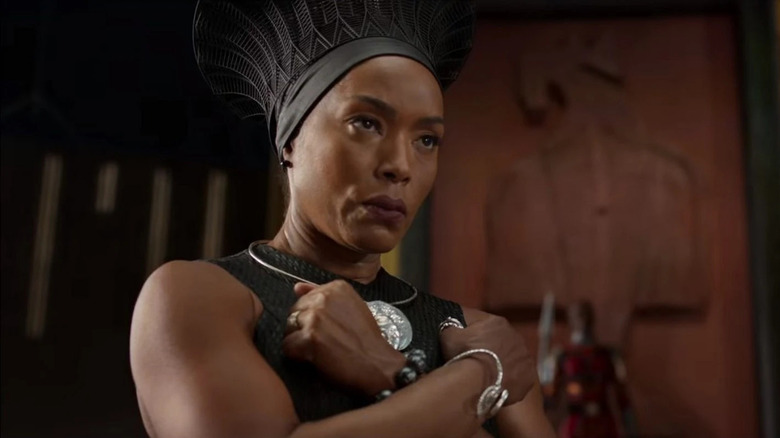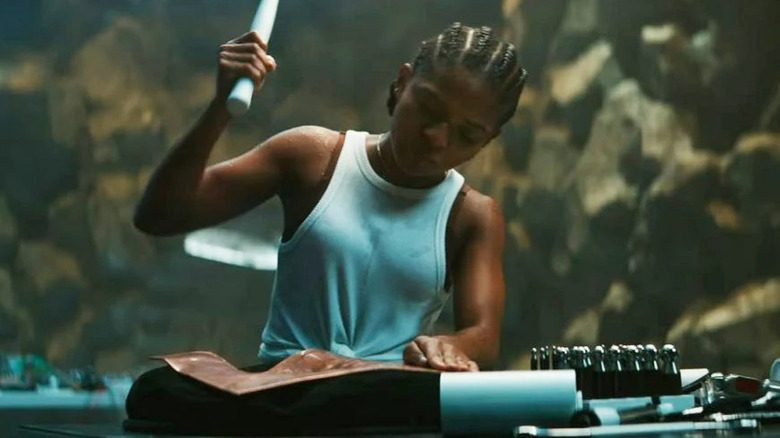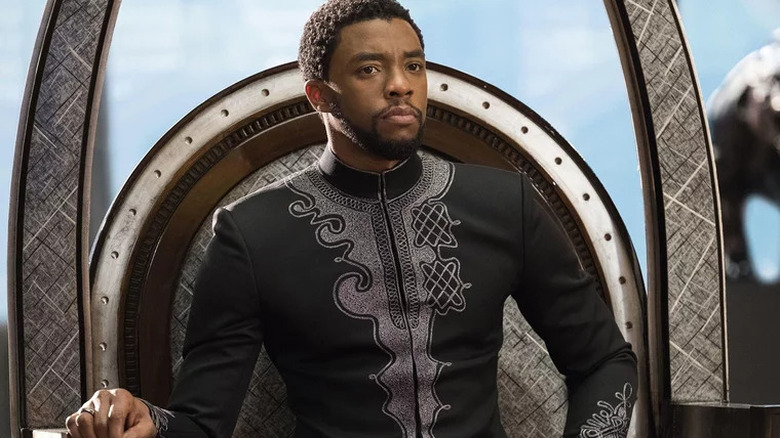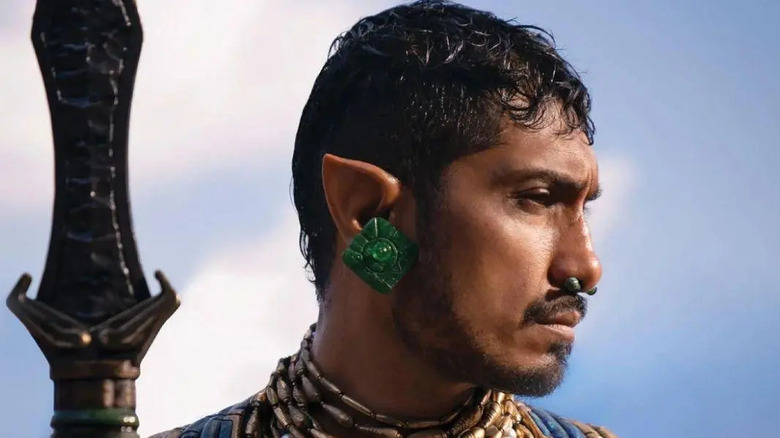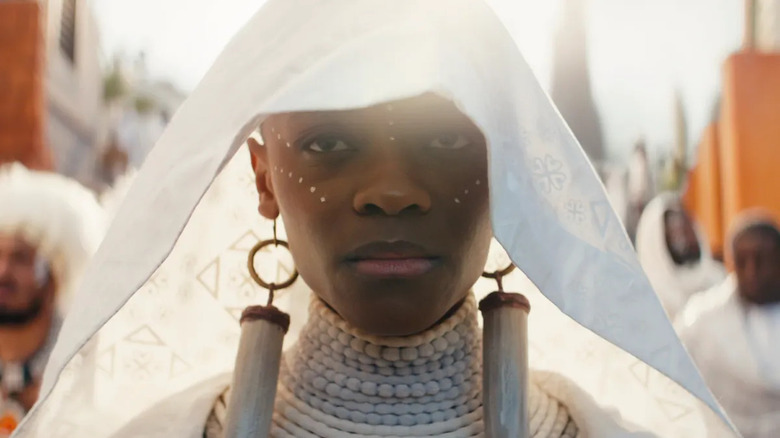Every Main Character In Black Panther: Wakanda Forever Ranked Worst To Best
Warning: This article contains major spoilers for the movie "Black Panther: Wakanda Forever."
If you're reading this, you likely cared for the life and career of Chadwick Boseman, the late 43-year-old actor who played T'challa the Black Panther across four Marvel movies and made an indelible impression on pop culture forever. Boseman will forever be inseparable from the role that made him legendary. "Wakanda Forever" makes that crystalline clear, which is why T'challa will appear on this list of the best characters in "Black Panther: Wakanda Forever." The sequel knows the light of a young, gifted, Black artist and superhero is too bright to be snuffed out forever. Boseman is the guiding light of "Black Panther: Wakanda Forever," just as those who leave the mortal coil illuminate the path for those still living.
In many ways, this is what "Wakanda Forever" is about. In Ryan Coogler's blockbuster, grief meditation and how loss is processed define the futures of civilization and those who participate in it. For Namor (Tenoch Huerta Mejía), his mother's death leads to the creation of Talokan, an entire underwater metropolis. Shuri (Letitia Wright) transforms into the Black Panther after T'challa passes, but almost becomes a beacon of vengeance for her motherland to follow. Every character in "Wakanda Forever" is shaped by the acknowledged void at its center, and reveals new riches as their grief redefines how they'll move through life. That is what it means to say and believe "no one is ever truly gone." Here is every main character in "Wakanda Forever," ranked.
19. The U.S. Secretary of State
Richard Schiff is an excellent actor. He made Aaron Sorkin's walk-and-talks look like waltzing throughout "The West Wing." He's made every movie he's in a little bit better, from "Se7en" to "The Lost World" to "Black Panther: Wakanda Forever." That's why it's painful to report that who Richard Schiff plays in "Wakanda Forever" is somewhat ambiguous in the film. IMDb lists his character as the U.S. Secretary of State, but I don't think he's addressed as such in the movie. He's an ambassador to the United Nations on behalf of America, who doesn't actually have to be the Secretary of State. (For example, Joe Biden appointed Linda Thomas-Greenfield, who is not Antony Blinken.)
The reason I'm waxing poetic about diplomatic positions and not Richard Schiff's role in "Wakanda Forever" is that there's no role there. Schiff makes it feel like there are whenever he's on-screen; this is no indictment of him. It's a lamentation that "Wakanda Forever" got Toby Ziegler in the Marvel Cinematic Universe as government brass and left him out to dry, one of the very few ways this movie disappoints. Pour one out for anyone who wanted Schiff to do anything remotely interesting in the "Black Panther" sequel, and raise a toast to Schiff for getting that well-deserved Marvel money.
18. The French Secretary of State
The French Secretary of State (Gigi Bermingham) is another character whose name goes unuttered in "Black Panther: Wakanda Forever." We do know she represents the country of France and has the gall to act as if her nation didn't attempt to raid a Wakandan science vessel under the cover of night during the same United Nations meeting the U.S. Secretary of State (Richard Schiff) attends. If her job was hubris, she'd get a promotion.
Unfortunately, it's diplomacy, which she is exceedingly bad at as proven when her black ops raid team is dragged into the U.N. by the Dora Milaje and she is unable to muster even a word in response. Icarus flew too close to the sun; the haughty French Ambassador thought she could step into the world's most powerful nation run by a grieving Queen Ramonda (Angela Bassett). Her fall from grace is as potent as a plummet from the sky.
17. Namora
In the Marvel comics, Namora is Talokan royalty with a decade's rich history. Here, she's Namor's muscle; that isn't objectively bad. Recent Marvel movies have made a poor habit of being overstuffed, and not diving into when Namora defended Atlantis from a mobster named Stomp Richards is wise. That said, there's little room for Namora (Mabel Cadena) to blossom in "Wakanda Forever." She gets grace notes in some solid action sequences and serves the absolutely iconic look pictured above. Notably, one of the film's final scenes also hints at bigger, more resentment-fueled character development for her down the road.
Cadena's performance as Namora is also low-key astounding. The actress had to learn both Mayan and English for the role and convey the deadly ease of a supremely gifted warrior. She does and then some. Again, this isn't about Namora being a bad character. It's about the fact that there are richer characters in this story, or ones with more to do than Namora in an almost overstuffed movie. She'll get 'em next time.
16. Dr. Graham
Casting Lake Bell as Dr. Graham in "Black Panther: Wakanda Forever" is a fake out. Bell is a recognizable actress with credits ranging from comedic feature films ("In A World...") to cult television shows ("Children's Hospital"). Dr. Graham isn't a well-known character. The assumption is Graham will prove important because she's played by Lake Bell and leading the CIA's search for vibranium, the catalytic plot point of "Black Panther: Wakanda Forever." This is reinforced by how quickly we learn Graham's been searching for vibranium for ages and her easy comradery with Smitty, the exploration vessel's chief commanding officer. Graham will at least have a sizable role in this movie, yes?
No. Graham and the entire crew fall victim to Namor and his army's attack. It is a horror show marked by the sirens luring the boat's crew to leap off the boat's edges and drown with multiple officers getting speared. Graham almost manages to escape with her life and would have if not for the winged Serpent God himself. His takedown of Graham's escape helicopter is the first moment we encounter the character and a notable one. Graham doesn't read like a great character on paper, but her loss is instantly felt by the audience. Her function in the movie is essential to making Namor genuinely terrifying. She deserves her roses, even if the world of the MCU can't give her any.
15. Valentina Allegra de Fontaine
Who is Valentina "Val" Allegra de Fontaine (Julia Louis-Dreyfus) in the MCU? Over three increasingly sizable appearances, Val's been a professional pot-stirrer. In "Black Widow," she was a high-level government operative who helped Yelena (Florence Pugh) track down Clint Barton (Jeremy Renner). In "The Falcon and the Winter Soldier," Val went into recruitment mode and gave U.S. Agent (Wyatt Russell) his codename and a new suit despite the fact he publically murdered someone. Now, she's the director of the CIA, played with gusto by Louis-Dreyfuss, who will be a major cog in "Thunderbolts." The thing is Val only sort of works as a cohesive character in "Wakanda Forever" and the MCU at large. That's disconcerting.
Why? For all intents and purposes, the Everett Ross and Val subplot is the weakest element of "Black Panther: Wakanda Forever." It makes sense that Ross reenters the fold and Val heads the CIA — not to mention being Ross' ex gives her a place in this story. But it almost all amounts to sound and fury signifying nothing. Post-credits scenes aside, expansions to this universe are most effective when they don't feel forced to do so. Val is a joy to watch and compellingly motivated, but the sum of her role here seems like an addition from corporate brass.
14. Everett Ross
Everett Ross (Martin Freeman) is a great character, improved by Ryan Coogler's "Black Panther," transformed from a stodgy but morally just CIA suit to a guy willing to make the sacrifice play for a people his government mistrusts. Ross became more layered the second he arrived in Wakanda. He, unfortunately, returns to more of an expository position than anyone would desire.
Ross ostensibly runs back the end of his arc in "Black Panther" for the length of "Wakanda Forever." He remains a more humane member of civic government who is an ally to Wakanda, and when push comes to shove is willing to put himself on the line for Wakanda. That means he's extracted from the United States by the film's end but fails to establish anything new about himself besides counting Val as an ex over the course of the movie. Everett Ross is still a great character, but he's not made greater by this fantastic movie.
13. Attuma
There's an old adage that there are no small parts, only small actors. Accordingly, it doesn't matter how many lines you have because it's what you do with what you have that counts. Alex Livinalli, who plays Namor's trusted warrior Attuma, is not a small actor. Physically, he's massive. But Livinalli also seizes on Attuma's most important scene and makes it count for all its worth. In the span of one excellent fight with Okoye (Danai Gurira), Attuma reveals his value system and becomes one of the film's most formidable foes, all by saying very little.
Attuma values combat. It is the proving ground of one's worth as a person. When he battles Okoye it isn't just to apprehend Riri Williams (Dominique Thorne), it's to understand Okoye's mettle, make it unworthy, and end it. The fight is impeccably staged. It carries the real threat of danger, and that threat proves vital to making the film's heartbreaking second act feel properly foreshadowed. With very little screen time, Attuma shows us who he is and necessarily shifts the tone and course of "Wakanda Forever." No small parts or actors, indeed.
12. Griot
The MCU has a shockingly rich history of actors delivering memorable vocal performances as artificial intelligence. Paul Bettany turned his voice-only turn as J.A.R.V.I.S. in the "Iron Man" films into the beloved, live-action Vision. His wife, Jennifer Connelly, voices Peter Parker's suit in "Spider-Man: Homecoming." And that's to say nothing of James Spader's Ultron! So it shouldn't be a shock that Griot, Shuri's robotic A.I. assistant, makes this list. What is still a shock to many is that Griot is played by Trevor Noah (and was in 2018's "Black Panther" as well). Thankfully, Noah is allowed to flex a few more comedic muscles this time around.
Griot doesn't crack-wise. That's not his style. But, as the film progresses, he skirts the line of obedience to hysterical and plot-shifting ends. During a three-pronged escape Shuri, Okoye, and Riri Williams make from the FBI across Cambridge, Griot gently refuses to honor Okoye's plan in favor of Shuri's and then helps get her out of a bind. Earlier, he provides almost a third of the dramatic tension for Shuri's race to save T'challa's life. Griot may only appear on-screen via a screen, but his contributions to "Wakanda Forever" are vital, playful, and humane sans artifice.
11. Ayo and Aneka
When I first made a list of all the characters in "Black Panther: Wakanda Forever," I accidentally left Ayo (Florence Kasumba) and Aneka (Michaela Coel) out. This speaks volumes about what the two characters actually do in "Wakanda Forever." It's fantastic that the two are in a relationship and offer queer representation within the world of Wakanda. It's a little heartbreaking that said relationship is ostensibly revealed through tossed-off dialogue and given little to no breathing room within the movie. It's also great that Aneka favors Shuri's new daggers over the Dora Milaje's spears, but that's almost all there is to her character apart from her relationship.
Again, this movie is filled with characters and some inevitably get the short shrift. It's disappointing that Ayo, who received three-dimensional treatment in "The Falcon and the Winter Soldier," is one of them. There's nothing wrong whatsoever about either of these characters or what they offer. Still, both Ayo and Aneka rank near the middle because prior MCU projects or the actors who play them suggest much more is possible. Here's hoping.
10. Touissant
Chadwick Boseman was great with kids. He never got to have any of his own. It's not clear that he wanted any and, as this Esquire profile proves, it's abundantly clear he had a sparkling sense of humor, strong values, and deep empathy. Any child would be lucky to have a parent with any of those characteristics. So, in "Black Panther: Wakanda Forever," Ryan Coogler uses the magic of the movies to give Chadwick Boseman something he never had and acknowledge the spirits he raised from afar: he gives him a son.
Toussaint (Divine Love Konadu-Sun) is a six-year-old boy. In less than one minute of screen time, he establishes himself as the sort of shining light T'challa and Nakia (Lupita Nyong'o) would yield as parents. He is mischievous, sharing that his Wakandan name is T'challa. He is ungainly confident, admitting that one day he will be King of all Wakanda, and he is very much a kid. Toussaint feels like a real grade-school-aged human, not one beyond his years nor one precocious for being so special. He's the son of royalty and the epitome of his parents. That's why he's so wonderful. That makes him worthy of a solid ranking on this list.
9. Nakia
Nakia feels like a character with still untapped riches. It's not just because she's played by Lupita Nyong'o, who seems capable of doing anything as a performer; it's because, for two "Black Panther" movies in a row, the most interesting facets of her character have existed more on the films' margins than right within them. She is the love of T'Challa's life, but more of that love is spoken of than seen. She is capable of deep undercover work, but again, in "Black Panther," we hear about this more than witness it.
Both these elements receive some course correction in "Black Panther: Wakanda Forever." Even if it's impossible to see T'challa and Nakia together again, Nakia succinctly gets at the heart of their relationship through her grief: "He was King and Black Panther to everyone else, but to me ... he was everything. He was my T'Challa." T'Challa was Nakia's gravity, a love that shifted Earth. Crucially, then, we finally see Nakia on her own without T'Challa. Not only has she built an entire school on her own terms in Haiti, but Nakia also uses her resources alone to uncover the location of Tlālōcān, a city civilization hasn't found for centuries. She goes into battle and catalyzes Shuri to finish her synthesized sacred herb. "Wakanda Forever" shows us who Nakia is. No wonder T'Challa froze.
8. Killmonger
I can't help but gush: the Killmonger (Michael B. Jordan) appearance in "Black Panther: Wakanda Forever" owns on every level. It's a genuine surprise from a company that seemingly exhausted its capacity for surprise appearances right around "Spider-Man: No Way Home." More importantly, Killmonger's return vis-à-vis the ancestral plain honors the legacy he established in "Black Panther." There's been lots of chatter about how good the villains in Ryan Coogler's MCU movies are. This scene makes it clear that Coogler doesn't treat them like villains at all. They're men who do complicated, frequently awful things but have convictions and just aims. Most franchises would silence them altogether. "Wakanda Forever" keeps Killmonger's message alive and well.
Even more importantly, that message is now in service of showing Shuri who she is. Early on in "Wakanda Forever," Shuri says the grief she feels for T'Challa's loss has made her want to watch the world burn. Killmonger observes that sounds like him. "Are you going to be like your brother?" Killmonger sneers, "Or are you gonna take care of business?" Shuri wants to be a noble hero and leader. But at the exact moment she takes the sacred herb and goes to the ancestral plain, she craves vengeance. A lesser movie filled with lesser characters would avoid this thorny issue altogether. "Wakanda Forever" is not that movie, and Killmonger is a tremendous character still.
7. M'Baku
By my metric, M'Baku (Winston Duke) gets both the funniest and wisest lines of dialogue in "Black Panther: Wakanda Forever." The former is "you bald-headed demon," aimed at Okoye during a tribal council meeting, an insult no one but he could fling at her and hope to emerge unscathed. It's a moment that highlights the Jabari Tribe leader's unwavering confidence. As importantly, that confidence is integral to M'Baku's charisma. At this moment, we can see exactly why men and women follow him into battle and live under his rule.
We also saw examples of that in "Black Panther," though. "Wakanda Forever" gives us more. At the funeral of Queen Ramonda, M'Baku comes to Shuri for guidance. He wants to know if people should take refuge on Jabari lands in the wake of Namor's attack on the royal palace and surrounding city. Shuri, heartbroken, asks why he is coming to a child for advice. M'Baku says that she has experienced too much loss and sees too much horror in the world to be a child anymore.
Up until this moment, M'Baku has been the "Black Panther" franchise's favorite blunt instrument and all the more effective for being so. Here, we see his softness. Here, we learn there is wisdom and empathy, and patience behind his bravado. "Wakanda Forever" makes M'Baku a more layered character without sacrificing the qualities that made him appealing in the first place. It's a tremendous balancing act.
6. Okoye
Contrary to M'Baku, Okoye doesn't exactly grow as a character during "Black Panther: Wakanda Forever." She leaves and returns to the status quo. But, in Okoye's case, it's about the journey, not about the destination. When she and Shuri go to visit Riri Williams at MIT, we learn she's quite bad at doing makeup to cover up her head tattoo (this becomes a running gag throughout the scene and it is life-giving). We also see Okoye's lack of tact. Impatient with Shuri's diplomacy, she breaks into Riri's dorm room and brings her spear in order to ostensibly kidnap the young student if she won't follow them to Wakanda.
All of these are wonderful grace notes. What happens in the wake of them creates a symphony. Okoye is unable to stop Attuma and Namora from kidnapping Riri. As a result, Queen Ramonda strips her of the title of head of the Dora Milaje. To describe Okoye's subsequent breakdown as heartbreaking is an understatement. Put simply, it reframes the humorous sequences from before. Okoye's poor makeup job and overall blunt approach reflect how deeply the role of Dora Milaje runs in her. It's who she is. It's her calling in life. There hasn't been a need to learn anything else because there is no higher calling than this. Being a warrior is Okoye's love language, and the clarity with which "Wakanda Forever" reveals that vaults her high up this list.
5. Queen Ramonda
In the end, for Queen Ramonda, it was all about the furious statement and question from the first "Wakanda Forever" trailer: "I am queen of the most powerful nation in the world and my entire family is gone. Have I not given everything?"
The answer was "no." Queen Ramonda sacrifices herself for Riri at the midpoint of "Wakanda Forever," bringing the movie's meditation on loss and death front and center. Up until that moment, it has wrestled with a passing that occurred off-screen in every sense. But the real-life circumstances that informed T'Challa's absence give "Wakanda Forever" a different weight than most comic-book movies. When Ramonda passes, we are forced to see a character beloved by the audience and Wakandans alike pass away. That makes Ramonda one of the film's most vital characters.
That passing only matters if the way she lives throughout "Wakanda Forever" also soars. It does. For my money, the single most electric scene of Ryan Coogler's film is Queen Ramonda addressing the United Nations. That scene reveals Ramonda is a grieving mother who understands she will never get the chance to grieve in actual peace, no matter how many rituals she performs. She knows what the world whispers. For world powers, the death of T'Challa is a moment of Wakandan weakness. Her grief is their gain. Ramonda, with poise, cunning, and barely contained fury, proves them wrong. It's a model any person would be lucky to follow if they were capable of, and proof that Ramonda is one of the MCU's all-time great characters.
4. Riri Williams
Riri Williams loves the Chicago Bulls. Within her first two minutes on screen, she quotes a legendary track by Nina Simone. Minutes after that, she pulls a Tony Stark from "The Avengers" and risks dying from lack of oxygen to keep Shuri and Okoye alive. I don't know if I, a writer from Chicago that covers the MCU and is also a Nina Simone fanatic, wasn't going to adore Riri from the jump.
Biases aside, I also genuinely believe Riri is one of the best and most important characters in "Wakanda Forever." Shuri's journey through the film doesn't work without her. Riri is the lens through which we see and understand the hope and promise of young Black excellence. Shuri is not an outlier. And at a time when Shuri is more consumed by vengeance than powered by self-actualization, Riri is an essential counterpoint.
Furthermore, RiRi is a hero scientist who hasn't had the privilege of endless resources. If Shuri shows us what's possible when people of color are given the endless means white people of privilege get to harness their existing potential, Riri is a reminder that most people of color have to hustle for theirs. She still comes up winning; that rules. So does Riri's sense of humor, her poise in battle, and, yes, her passion for Chicago sports. The "Ironheart" series can't come soon enough.
3. T'Challa
T'Challa is a character in "Black Panther: Wakanda Forever." He may die off-screen in the movie's prologue, but his presence haunts the film's every frame. Chadwick Boseman may be gone, but "Wakanda Forever" takes pains to process how he lived and bookend its epic superhero saga with grief and a period of mourning. The movie makes audiences participate in the meditative ritual Shuri becomes brave enough to undergo at the film's end. T'Challa is this film's most important character.
And here's the thing: All the "recast T'Challa" chatter that has popped up in the wake of the "Wakanda Forever" release is proof of how difficult it is for audiences to let this character go. Humans generally want heroes to get the death they deserve. The loss of Tony Stark was devastating but it's everything any fan of his could have hoped for him. That's not what T'Challa's death off-screen feels like. It's absolutely not, speaking as a cancer survivor, what colon cancer feels like either. Both are emotionally unsatisfying and horrifically mundane. T'Challa doesn't deserve that. Neither did Chadwick Boseman. But in refusing to let the Black Panther's fictitious passing be a balm, Ryan Coogler has actually forced audiences to reckon with how wonderful he was. Not every character can power an entire movie while barely appearing in it. T'Challa can and have it be a cathartic, unbelievable one at that. It's downright remarkable.
2. Namor
In "Black Panther: Wakanda Forever," we learn Namor is "the child of no love." He also claims that only the most broken people can be the best leaders. There is truth and wisdom in both his claims, yet what makes Namor such an arresting antihero (besides Tenoch Huerta Mejía's star-confirming performance) is that he's also wrong on both counts. Namor is beloved by his people, having all but created Talokan and made it an oasis for centuries. The vibrancy of the city is felt and seen by Shuri the second that he takes her on a tour of it. There is love in Namor's life; he just can't feel it.
There's zero doubt that Namor feels broken and identifies as such. There's also zero doubt, by the end of "Wakanda Forever," that he is an excellent leader. Here's the rub: Namor could choose to heal his brokenness and doesn't. His yielding to Shuri at the film's end is a tactic. The connection they forge together is as strategic for him as it is sexually charged. Namor had decided that leaders need to be broken. Shuri's journey implies they have to heal. The film gives no quarter to either, letting both ideologies lie and have their say. There has never been an "MCU villain" who gets such treatment, which is why Namor — despite his actions — isn't really a villain at all. He's a complicated character worthy of his comic book legacy.
1. Shuri
"Black Panther" posited that Shuri is a woman of science. "Black Panther: Wakanda Forever," for a split second, reveals that she is also a woman of faith. In the first moments of Ryan Coogler's movie, we hear Shuri praying that the ancestors spare her brother and give her the strength and ability to heal his disease. They do neither. Shuri goes on to reject rituals and throws herself into her lab work. When she later uses her scientifically created synthetic herb to perform the Black Panther ritual, she doesn't see her mother or brother on the ancestral plain — she sees Kilmonger. This isn't what she wanted from the Elders either. But it is, as Nakia points out, who and what she needed to see.
Shuri's story illuminates how having faith means absconding from what we want faith to yield to us. It suggests that, in truth, science and faith will always be connected in practice; it's institutions that keep them apart. To believe too strongly that something is meant to be (to try and right what's already happened) is the fastest path to vengeance and an unrighteous life. This is heady and morally complicated stuff for any hero's journey, much less one filling the shoes of an iconic character. Shuri and Letitia Wright are up to the task.
No one would've wanted this film for Shuri. Inexplicably, we're lucky we get it. Shuri becomes one of the most complicated, moving, and layered characters in the MCU by the end of "Wakanda Forever." There is no one more deserving of the top spot than her.
